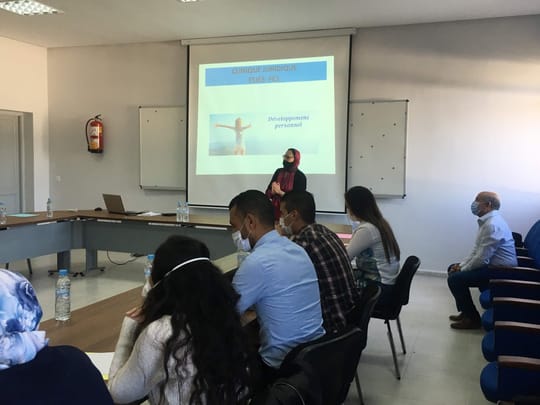Personal Development & Participatory Communication Training | USMBA Law Clinic, Fes

Law students at the Faculty of Economic and Social Legal Sciences at University Sidi Mohamed Ben Abdellah participate in a training on Personal Development and Participatory Communication.
On October 17th and 24th, 2020 the Legal Clinic housed at University Sidi Mohamed Ben Abdellah’s Faculty of Economic and Social Legal Sciences in Fes (FSJES-USMBA) held a training on Personal Development and Participatory Communication. This was the first of a series of trainings designed to strengthen the capacity of students who are preparing to become student clinicians.
In tandem with their university curriculum, these technical sessions give students practical information that will be directly applied to their service delivery and other advocacy activities conducted within the clinic’s framework. Not only will underserved populations in the Fes-Meknes region be able to receive legal assistance at no charge, the students will be participating in a service learning experience that will be invaluable to them as they proceed toward their own career aspirations.
Malika Souhayl, a personal development coach and an expert in interpersonal and professional communication, conducted the first training on Personal Development and Participatory Communication. Ms. Souhayl conducted two separate sessions for the group of students to accommodate public health restrictions. Each of the sessions began with an introduction where Ms. Souhayl asked the participants to express themselves through their “life motto”. They then participated in a self-awareness exercise. Ms. Souhayl encouraged each participant to speak, creating a friendly and ambitious atmosphere, according to those that were present in the room.
A central theme of the discussions during this session was the evaluation of soft skills and decision making in groups. Ms. Soukayl encouraged the participants to identify their own values and cultivate positivity in order to promote the achievement of their goals. The participants evaluated case studies to analyze responses to certain situations.
Following these activities and subsequent discussions, the clinicians discussed their own career experiences and situations to avoid in order to adapt in the future. Ms. Souhayla then organized several exercises to moderate the group and support the participants in freely expressing and better understanding themselves. Moving forward, students will be able to apply these skills toward their collaboration in future clinic projects.
Participatory communication is a central theme in the framework of the legal clinic, and of the High Atlas Foundation. Participant ownership in project identification, design, management, and monitoring processes is vital not only to its success, but also to its sustainability.
There are several contexts in which the participatory approach can be applied. In order to troubleshoot issues with the processes of the legal clinic, students and staff will work collaboratively to find a solution, using participatory processes. Moreover, these strategies will be particularly useful as clinicians are supporting community members with legal counsel. Civil society organizations will work with staff and clinicians to identify challenges and develop solutions in their communities through participatory methods as well.
This training session was one of several trainings organized by the High Atlas Foundation that is designed to prepare students to become practitioners of pro bono legal aid to people in vulnerable situations in the Fes-Meknes region.
Learn more about how you can support the efforts of the Legal Clinic here.
The High Atlas Foundation is working in partnership with the Faculty of Economic and Social Legal Sciences at the University Sidi Mohamed Ben Abdellah (USMBA) in Fes to operate and grow a Law Clinic and Legal Aid program which actively engages students in experiential and service learning for the benefit of marginalized communities in the Fes-Meknes region. The project is funded by the National Endowment for Democracy (NED) and the U.S.-Middle East Partnership Initiative (MEPI).